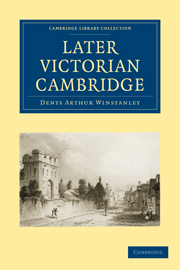Book contents
- Frontmatter
- D.A.W. A Memorial Note
- Contents
- PREFACE
- Chapter I ROBINSON'S VOTE
- Chapter II THE JUDGES AND TRINITY COLLEGE
- Chapter III THE RELIGIOUS TESTS (1862–1871)
- Chapter IV THE CAMBRIDGE UNIVERSITY AND CORPORATION ACT
- Chapter V EDUCATIONAL REFORM (1860–1880)
- Chapter VI THE TRINITY REFORMERS
- Chapter VII THE STATUTORY COMMISSIONERS AND THE UNIVERSITY
- Chapter VIII THE STATUTORY COMMISSIONERS AND THE COLLEGES
- Index
Chapter III - THE RELIGIOUS TESTS (1862–1871)
Published online by Cambridge University Press: 07 September 2010
- Frontmatter
- D.A.W. A Memorial Note
- Contents
- PREFACE
- Chapter I ROBINSON'S VOTE
- Chapter II THE JUDGES AND TRINITY COLLEGE
- Chapter III THE RELIGIOUS TESTS (1862–1871)
- Chapter IV THE CAMBRIDGE UNIVERSITY AND CORPORATION ACT
- Chapter V EDUCATIONAL REFORM (1860–1880)
- Chapter VI THE TRINITY REFORMERS
- Chapter VII THE STATUTORY COMMISSIONERS AND THE UNIVERSITY
- Chapter VIII THE STATUTORY COMMISSIONERS AND THE COLLEGES
- Index
Summary
When Lord John Russell on 23 April 1850 informed the House of Commons that he intended to advise the Crown to appoint a Commission of inquiry into the educational system of the two ancient universities and the distribution of their revenues, he expressed the opinion that the “question, important as it is, of the admission of Dissenters to the Universities” should not be considered in conjunction “with any improvement in the plan of education”; and, accordingly, the Royal Commissioners were not instructed to inquire into the effects and operation of the religious tests in force at Oxford and Cambridge. The Oxford Commissioners nevertheless called attention in their report to the fact that “several members of the University have recorded in their evidence a strong opinion that the present policy in this matter should be abandoned”; and on their own behalf, while refraining from offering “any suggestion as to the manner in which the evil should be remedied”, they expressed the “conviction that the imposition of subscription, in the manner in which it is now imposed in the University of Oxford, habituates the mind to give a careless assent to truths which it has never considered, and naturally leads to sophistry in the interpretation of solemn obligations”. The Cambridge Commissioners were more guarded in their condemnation of the system.
- Type
- Chapter
- Information
- Later Victorian Cambridge , pp. 36 - 90Publisher: Cambridge University PressPrint publication year: 2009First published in: 1947

